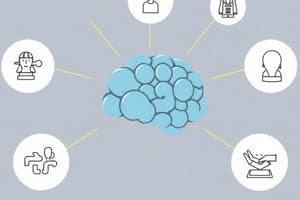Podcast
Questions and Answers
Which of the following key motivation concepts is correctly defined?
Which of the following key motivation concepts is correctly defined?
- Goal-setting theory involves setting specific and challenging goals. (correct)
- Intrinsic motivation is driven by external rewards.
- Self-determination theory focuses solely on external factors.
- Extrinsic motivation comes from within the individual.
In Alderfer's ERG theory, which of Maslow’s needs correspond to the 'Growth' category?
In Alderfer's ERG theory, which of Maslow’s needs correspond to the 'Growth' category?
- Esteem and Self-actualization needs (correct)
- Love/Belonging needs
- Safety and Esteem needs
- Physiological and Safety needs
Which of the following factors is considered a hygiene factor in Herzberg's theory?
Which of the following factors is considered a hygiene factor in Herzberg's theory?
- Responsibility
- Company policies (correct)
- Achievement
- Recognition
Vroom's expectancy theory is primarily concerned with which of the following?
Vroom's expectancy theory is primarily concerned with which of the following?
Which of the following is a common way people deal with perceived inequities?
Which of the following is a common way people deal with perceived inequities?
Flashcards are hidden until you start studying
Study Notes
Motivation Concepts
- Key motivation concepts include Maslow's Hierarchy of Needs, Alderfer's ERG Theory, Herzberg's Two-Factor Theory, and Vroom's Expectancy Theory.
Maslow's Hierarchy of Needs and Alderfer's ERG Theory
- Maslow's five needs: physiological, safety, love, esteem, and self-actualization needs.
- Alderfer's three categories of existence, relatedness, and growth needs, which integrate Maslow's five needs:
- Existence needs: physiological and safety needs.
- Relatedness needs: love and esteem needs.
- Growth needs: self-actualization needs.
Herzberg's Two-Factor Theory
- Five hygiene factors: salary, supervision, working conditions, company policy, and job security.
- Five motivation factors: achievement, recognition, work itself, responsibility, and advancement.
Vroom's Expectancy Theory
- Expectancy Theory explains motivation in terms of individual expectations and perceived rewards.
- Three components: expectancy (effort-performance relationship), instrumentality (performance-reward relationship), and valence (perceived value of rewards).
Dealing with Perceived Inequities
- Perceived inequities can lead to feelings of unfairness and dissatisfaction.
- Ways to deal with perceived inequities: leave the job, change the reference group, distort perceptions of self or others, or attempt to alter the situation.
Studying That Suits You
Use AI to generate personalized quizzes and flashcards to suit your learning preferences.




